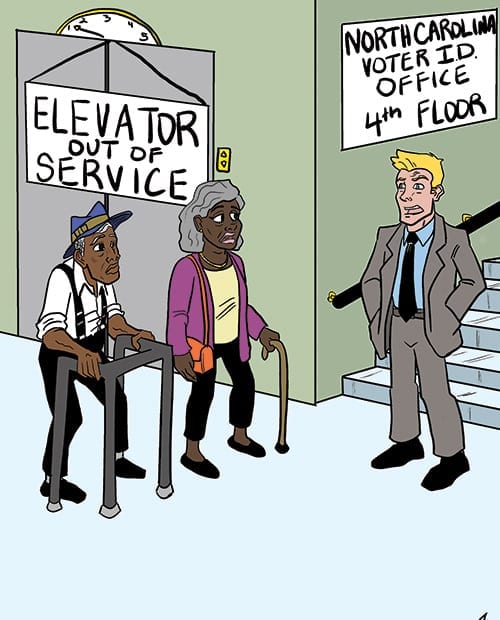
Conservatives reject the assertion that the objective of new voting rights laws is to suppress the minority vote. According to the Brennan Center for Justice there have been 25 laws and two executive actions passed in 19 states since 2011. While it is true that every state proposing or making a change does not have a history of racial unrest, there is still substantial evidence to conclude that one goal of the new laws is to frustrate efforts of blacks and the less affluent to vote.
The decision of the U.S. Supreme Court last June to strike down Section 4 of the Voting Rights Act of 1965 seemed to sanction efforts to revise voting laws across the country. With a stroke of the pen the court freed nine states (Alabama, Alaska, Arizona, Georgia, Louisiana, Mississippi, South Carolina, Texas and Virginia) as well as several counties and other political jurisdictions from the restrictions of Section 5. Changes in voting laws in these locations no longer have to be subjected to federal pre-clearance.
Despite denials by conservatives of a plan to restrict the voting power of minorities, there is a sufficient history of voter suppression to cause suspicions. That is what the Jim Crow era in the South was about. In many areas of the South, freed slaves who became citizens with the passage of the 14th Amendment in 1868 outnumbered whites. Without the imposition of literacy tests, poll taxes and outright violence, blacks would have become politically dominant in the post-Civil War South.
A similar demographic reality is now developing. According to the U.S. Census Bureau, as of July 2011, a majority of the nation’s population (50.4 percent) that is younger than age 1 are what were once called “minorities.” Projections are that by 2043, whites will no longer be the nation’s majority population.
Republican analysts know how to read the tea leaves. The Romney voters in 2012 were primarily older white men. Obama won 93 percent of blacks, 71 percent of Hispanics and 73 percent of Asians. As the white population declines relative to the total U.S. population in future years, mitigation of the minority vote will be a significant strategy for conservatives to win political victories.
The growing political assertiveness of blacks makes the electoral problem for conservatives even more serious. In the 2012 election, 66.2 percent of registered blacks went to the polls compared with only 64.1 percent of whites. In 2012, blacks constituted 12.5 percent of the eligible electorate but were 13.4 percent of those voting. These data on successful black performance do not indicate, as some suggest, that conservatives did not attempt to obstruct the black plebiscite. What they show is that any efforts failed.
The new voter ID bill passed in North Carolina and signed into law by the Republican Gov. Pat McCrory illustrates the excessive provisions that are designed to exclude minorities, the poor and the young. The law requires a government-issued voter ID — a driver’s license, passport, veteran’s ID or a tribal card. Same-day registration is eliminated as well as early registration for those who will be 18 on Election Day. Early voting will also be reduced.
As one might expect, such restrictions reduce voter registration in the U.S. Records indicate that only 68 percent of eligible Americans were registered in 2006. The rates are higher in other industrialized nations: In Great Britain, 97 percent of eligible citizens are registered, in Canada and Germany 93 percent are and in France 91 percent of those eligible are registered.
Conservatives claim that states have a constitutional right to establish voting procedures, even if it is a hardship for minorities and the poor to comply. The right to vote is too fundamental to permit procedures that disenfranchise so many.






